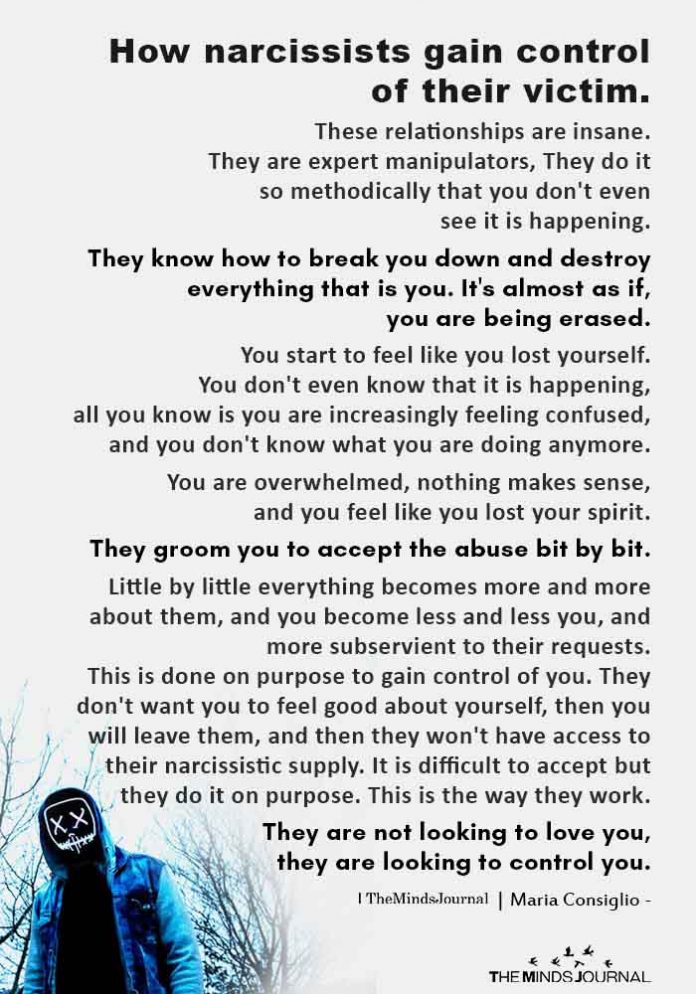Are you tired of a narcissist’s toxicity, and cheap tricks, and want to know how their mind works? Then you should take a look at a narcissist’s playbook.
You know all these tricks. You’ve probably used some of them in a pinch. You’ve certainly suspected others of using them. When someone uses them mix-and-match and wall-to-wall, you rightly begin to wonder if they’re just an absolute narcissist—a gloat-boat.
You stop listening to the ideas they espouse because all you hear is know-it-all, say-no-to-it-all deflection. If it’s a challenge to their authority, they’ve got a ready reason why it’s just plain wrong, a generic reason in that you could apply any of these tricks in pretty much any situation in defense of anyone.
They’re mercenary tricks. All-purpose ways of saying “Nope, I’m always right and you’re just a fool.” That’s why they come across as robotic. It takes no thinking to use these tricks, and once you come to depend on them, you’re ready for anything. You can shut down your heart and mind because they only get in the way of automatically deflecting all challenges.
Some end with the awkward -izing or -ifying. I use these as they are used in “moralizing” or “justifying.” They tend to mean “deliberately misrepresenting.” And the list could go on. Humans are ingenious, but perhaps most ingenious at developing all-purpose self-defenses that, strung together mix and match, can be used to make ourselves feel infallible.
Here Is The Absolute Narcissist’s Playbook:
1. “In our debate, obviously you’re dead wrong.” Self-umpiring. Pretending you’re the judge who decides the winner of an argument you’ve entered.
2. “Don’t be defensive.” Fake-neutrality. Pretending you’re stating a fact when it’s just your opinion. Saying “You’re defensive,” instead of saying, “I think you’re being defensive.”
3. “Hey now, you don’t know that for sure.” Going uncertain. Posing as the scientifically skeptical authority by casting uncertainty on any challenge to your opinion.
4. “Hey! No fair! You won fair and square. If this was a fair contest, I’d win, too.” Sore loser umping. When losing, pretending that a fair contest means an equal outcome.
Related: 10 Manipulative Strategies Used By Narcissists To Dominate You
5. “You’re wrong which proves I’m right.” Default logic. Assuming that if you can find even one thing wrong with a challenger’s arguments, you’re automatically right by default.
6. “You think that?! You don’t know anything, do you?” Infallibility baiting. Turning a debate into a winner-takes-all contest to prove you’re right about everything and your opponent is wrong about everything.
7. “I have a right to talk!” Libertizing. Pretending that challenges to your authority are challenges to your right to say anything without pushback. Pretending that your obsession with your right to dominate proves that you’re a crusader for freedom of expression.
8. “Ha! I see that the truth upsets you.” Taunting. Pretending that an emotional response disqualifies anyone who challenges you. This one is especially handy late in an argument. After having frustrated your opponents with absolute unreceptive, you can pull this one out as a coup de grace.
9. “Don’t tell me about justice! I hate when people are unjust to me!” Justicizing. Pretending that your obsession with fairness to you makes you the authority on fairness.

10. “I pity you, you’re so stupid. Sad.” Crocodile tears. A put-down dressed up as sympathy.
Related: 20 Narcissistic Terms: A Glossary of Terms for Understanding Narcissism
11. “Wow, I’m disappointed. I expected more from a professional like you. You should have responded respectfully to me after I called you a blithering idiot.” Connoisseur-ratting. Pretending to be the upholder of high standards. Delivering put-downs dressed up as upholding high standards.
12. “Hey, be nice! Shame on you for shaming people.” Nicessism. Narcissistically shaming someone by treating all of their challenges as personal insults. Including “shame on you for shaming people!”
13. “Why can’t we get along by you compromising to me?” Pacifizing. Pretending that because you want a compromise from others you’re a crusader for compromise.
14. “You’re being disrespectful so you’re wrong.” Killing the messenger. Disqualifying challenges to your authority because they weren’t delivered by the exacting standards you hold only for others, not yourself.
15. “You used an ad hominem argument therefore you’re wrong.” Ad hominizing. Citing the most basic logical fallacy as a way to claim authority. An ad hominem argument or personal attack doesn’t prove the attacker right. Neither does it prove them wrong. Ironically, you can accuse a personal attacker of being automatically wrong for using a personal attack.
16. “Hey, my intentions are pure. Don’t they count for everything?” Virtual virtue. Doing a quick and gingerly investigation of your motives, declaring them pure, and acting like your self-report is the last word.
17. “If there’s one thing I know, it’s when people are wrong.” Talkiswalkism. Assuming that people owe you credibility when you flatter yourself, for example, thinking people should believe you when you declare yourself the arbiter of truth.
18. “I don’t mean to be critical but you’re an idiot.” False-caveating. A variation of virtual virtue and talkiswalkism. Pretending that because you say you’re not doing something you’re not doing it.
19. “I didn’t mean to hurt you.” Meanly-mouthing. Pretending your self-reported intentions should automatically put others at ease. None of us really know all we mean to do. And while we might not mean to do something, we’re often happy to do it as a side effect of something we mean to do. For example, “Yes I had an affair but I wasn’t deliberately trying to hurt you. Hurting you was just a side effect of me trying to score.”
Related: The Narcissistic Dictionary: Terms That Describe Narcissistic Behaviors
20. “Moi? How dare you compare me to them!” Exceptionalizing. Pretending that it’s outrageous that anyone would consider you as a member of the same species as some human you don’t like.
21. “Me, not listen? I’m the best listener!” Robo-denial. Automatically refuting an accusation by claiming you have the most virtue.
22. “Whatever. But answer me this.” Playing interrogator. Filling the air with challenges and questions. Taking control of the conversation by flooding it with your demands.
23. “Don’t even think of challenging me until you’ve learned everything I have.” Schooling. Declaring challengers disqualified unless they study everything that affirms your position.
24. “I’m right because many people agree with me.” Massifying. Pretending selectively that popular opinion decides truth.
25. “I’m right because I’m like Jesus or Einstein and the masses are fools who just don’t understand.” Self-martyring. Pretending that because you have an outlying position, you must be right.
26. “I’m honest so I speak the truth!” Truth-gutting. Confusing honesty with truth, conveniently forgetting that plenty of people honestly believe falsehoods.
27. “I’m right because someone ancient agreed with me.” Toga-cred. Pretending that old means true.
28. “I’m right because someone famous for something entirely different said it.” Over-generalized status-cred. Pretending that if someone was right about one thing, they’re the last word on everything.
Related: 5 Projection Techniques Narcissists Use To Attack Others
29. “I’m right because the truth was revealed to me or someone from a supernatural source.” Revelation. Pretending you have special access to the last-word truth channeled directly to you that trumps the scientific method’s trial and error process.
30. “Moi? How dare you say I have that trait?! I hate that trait.” Exempt by contempt. Pretending that hating a behavior when others do it to you proves that you don’t do it to others.
31. “Yeah, but this insight really moved me so it’s the last word.” Meming. Being wooed by an insight so appealing you don’t think there’s any need for any other insights ever again.
32. “Nothing arrogant about it. I simply happen to know I’m the best at deciding what’s true.” Self-convincing. Pretending that because you checked and agree with yourself again and again you must be right about everything.
33. “Evidence? I have no use for evidence. I have faith and I’m damned proud of it.” Proud faith. Pretending that a blanket refusal to reconsider other possibilities is a badge of honor.
34. “That’s boring, confusing, or difficult, therefore it’s irrelevant.” Pseudo-objectivism. Pretending you are the measure of all things and that if something isn’t intuitive to you, you can dismiss it as false.
35. “I don’t know about that so it’s impermissible as evidence.” Blanking-blocking. Pleading ignorance not as an admission of your limitations but as evidence of your authority.
Related: Why The Narcissist Devalues You? 5 Reasons You Should Know
36. “Is it true? Yes, I hope so.” Reality/hope blurring or magical thinking. Pretending that what you want to think is true is therefore true.
37. “Oh, you just don’t want to believe it.” Reality/hope blurring or dreadful thinking. Pretending that you must be right because your challengers don’t believe it.
38. “You’re just trying to make me look wrong.”

39. “It just is.” Literal unreasonableness. Not giving reasons. Employing the words “just” or “only,” which means ignore all other possibilities.
40. “I’m just trying to be righteous, doesn’t that count for everything?” Self-sanctifying. Claiming pure motives as though you’re high self-regard decides anything.
41. “I win because I’m more hysterical than you.” Out-maniaciking. Pretending that debates are won not by realism but by passion, as though if you exaggerate most wildly and passionately your insistence trumps all other considerations.
42. “In general never generalize. Your kind always stereotypes us so you’re wrong about everything.” Hypocritical generalizing. Pretending that an unflattering generalization is wrong because it’s a generalization.
43. “Don’t tell me how I feel! I’m the authority on how I feel! You just want to put me down.” Hypocritical psychologizing. Pretending you believe that people always know what they feel as a way to keep people from psychologizing you while you psychologize them.
Related: 8 Tricks Narcissists Play To Manipulate Their Victims
44. “How would I do it? By succeeding!” Goalifizing. Pretending that fanatical passion to reach a goal is all it takes to achieve it.
45. “I’m principled; you’re pigheaded. They’re totally different! Don’t you know that?!” False distinctions. Pretending a double standard isn’t one by declaring a difference without explaining it.
46. “Fine, I’ll shut up forever so you can dominate.” Caricaturizing. Making them sound ridiculous, to shame them out of it.
47. “You question my argument? Fine. I’ll start all over again.” Insistent replay. If they question your argument, declare it over and over again until they give up.
48. “Shame on you for violating whatever absolute moral principle my behavior demonstrates I don’t care about at all except when it comes in handy for guilt-tripping a challenger into submission.” Moralizing. Blaring your police siren so loud it drowns out the sound of your own violations.
49. “Shame on you for being so insensitive as to trespass on my unchallengeable safe space.” Theatrical hypersensitivity or PC. Pretending to be offended to shut people up.
50. “Shame on you for being so sensitive as to encroach on my unchallengeable freedom to trespass.” Theatrical hyper-insensitivity or anti-PC. Barking at people for not tolerating your barking so you can get them to back off.
51. “I’ve been oppressed, so from now on, I’m right about everything.” Victim-vindication. Pretending that having been wronged makes you permanently right.
52. “I didn’t say what you heard me say! You must have heard wrong.” Misinterpretizing. Rather than facing and addressing your inconsistencies, pretending your challenger misunderstood you.

53. “Oh, so you’re saying we should all just be stupid?” Misinterpretizing.
54. “Jeez, I was just joking. My, aren’t you hypersensitive?” Ironizing. Theatrical revising the past they say that they were only kidding. Irony is useful but easily abused as a no-tag-backs way of dodging challenges to our assertions.
55. “Sounds like you have biases.” Blind self-exemption. Treating universal human traits as rare pathologies of the weak and maladjusted.
56. “So what? Everybody does it!” False equivalentizing. Ignoring questions of degree to justify your excesses.
57. “If you’re not absolutely pure, your challenges mean nothing.” Puritanizing. Harping on the tiniest fault, real or imagined in your challengers as if their humanness proves your saintliness.
Related: 63 Most Commonly Used Phrases By Narcissistic Mothers
58. “Look, when I say you’re pigheaded and I’m steadfast, I’m just calling a spade a spade, nothing more.” Spinflexing. Using loaded terms as though they’re descriptive.
59. “You don’t agree with me about how to achieve X? You must not want to achieve X.” Exploitative extrapolation. Willfully confusing means for ends as though anyone who disagrees with your means must not share your ends.
60. “I’m proud to demand more, stand my ground, speak up for myself, uphold my principles and, furthermore, hold high standards, whereas you, you’re just being pushy, attached, demanding, obnoxious, and, not only that, pigheaded.” Spinplex pile-on. Reiteration disguised as reasoning. Employing loaded synonyms to make your argument appear longer and stronger and their argument seems weaker.
61. “That’s just talk, words, theory, abstraction or semantics” Wordy anti-wordism. Accuse them of empty talk without showing any curiosity about why your talk counts and theirs doesn’t.
62. “My belief is simpler (or more complicated) so I’m right.” Formulizing. Pretending that there’s an easy formula for deciding who’s right, one that makes you right.
Related: 10 Ways To Deal With Toxic People Who Spread Negativity
63. “I’ve stacked carefully selected and edited arguments in my favor that prove I’m right. Cherry-picking. Ignoring counter-evidence to claim absolute certainty. “Giving up on debating me proves you’re wrong about everything.”
If you want to hear them used in action to deflect all challenges and, more importantly how to defeat people who will say or do anything to remain undefeated, check out my YouTube podcast episode:
https://www.youtube.com/watch?time_continue=2&v=P7ADqVZObng&feature=emb_title
Here’s that same fight with an absolute narcissist annotated:
Written By Jeremy Sherman
Originally Appeared In Psychology Today Article Link 1 and Article Link 2
Understanding narcissists and their cheap tricks might seem very complex, but in reality they are not. The next time you feel insulted, outraged, or dumb-founded by their behavior, take a look at the narcissist’s playbook. Everything will fall into place, and because you will have a better understanding of them, you will be able to knock their toxic games out of the park.









Leave a Reply
You must be logged in to post a comment.